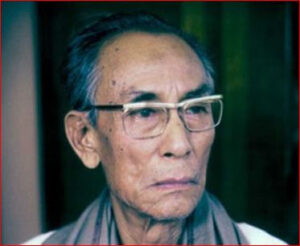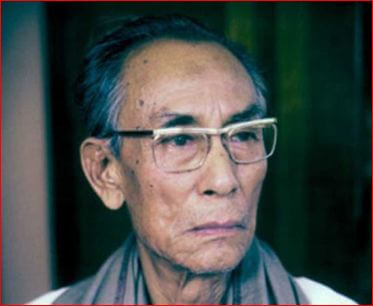Sachin Dev Burman is a legendary figure in Indian music history who is renowned for his significant contributions to Bengali and Bollywood films. Burman, who was born in Comilla, Bengal Presidency (now in Bangladesh), on October 1, 1906, is renowned for his extraordinary vocal and compositional skills. His distinctive style of fusing modern tunes with traditional Indian music made him a trailblazer in the field.
Indian folk, classical, and semi-classical traditions are all perfectly encapsulated in S. D. Burman’s ageless compositions. His partnerships with renowned playback singers like Mohammed Rafi, Kishore Kumar, and Lata Mangeshkar produced some of the most enduring songs in Indian movie history.
Throughout his brilliant four-decade career, Burman wrote the soundtrack for over 100 motion pictures and won multiple awards, including the esteemed National Film Award. This biography explores S. D. Burman’s life and creative output, thoroughly examining his accomplishments, approach, and lasting influence on the music industry. Discover the incredible journey of the maestro who changed Indian cinema’s sound design.
Don’t miss:
- Biography Of Diljit Dosanjh: Wife,Career, Awards & Celebrity Facts
- Aditya Narayan – Biography, Height, Age & Family
Early Life Of S. D. Burman
In Agartala, Tripura, at Kumar Boarding, S. D. Burman attended his first school. The Kumar Boarding School was reserved for royal sons. Burman’s father observed that the instructors were less focused on teaching and more on entertaining the noblemen’s sons. He was taken from boarding by his father. Then he accepted him to Comilla’s Yusuf School. In 1920, he earned his S.S.C. Following that, he was accepted to Comilla Victoria Government College.
In 1922, he earned his IA, and in 1924, his BA. Burman moved to Kolkata to enroll in Calcutta University’s MA program, but he never finished since music permanently overcame him. He trained with musician K. C. Dey to begin his official music studies.

Profile Of S. D. Burman
- Full Name: Sachin Dev Burman
- Nickname(s): Burman da, Kumar Sachindra Dev Barman, Sachin Karta, and the Grand old man of music
- Date of Birth: October 1, 1906
- Birth Place: Cumilla, Bengal Presidency, British India (present-day Bangladesh)
- Zodiac sign: Libra
- Nationality: Indian
- Religion: Hinduism
- Marital status: Married
- Spouse: Meera Dasgupta
- Occupation(s): Music director, Folk artist, Singer, Composer, Musician
- Genres: Indian classical, Bengali folk music, Folk, Indian music, film
- Instrument: Vocals,sarod,tabla,sarangi,sitar
- Died: October 31, 1975 (aged 69) Bombay, Maharashtra, India
- Years active: 1932 – 1975
S. D. Burman’s Personal Life
On February 10, 1938, S. D. Burman tied the knot with Meera Dasgupta, a musician and lyricist from Bengal. Famous music composer R. D. Burman was their only child, born on June 27, 1939. Only Burman had written almost as many songs with Kishore and Rafi as any other composer. Kishore was his second son in his eyes. Kishore acknowledged that Sachin Da was the one who initially gave him a chance. Shortly after practicing the song “Badi Sooni Sooni Hai” for the movie Mili, S. D. Burman entered a coma. On October 31, 1975, in Mumbai, he passed away following a few days of being in a coma.
S. D. Burman’s Career
In his late 20s, Burman began his career as a radio vocalist on Calcutta Radio Station. Bengali folk music and light Hindustani classical music were the main influences on his creations at that time. In 1932, “Khamaj” and “E Pathey Aaj Eso Priyo” from his debut album were also published. Burman relocated to Bombay in 1944. The next year, he made his first significant breakthrough with the company’s Do Bhai. His breakthrough hit was the song Mera Sundar Sapna Beet Gaya, sung by Geeta Dutt. Burman collaborated with Navketan Films, owned by Dev Anand, in the 1950s. They make hits like Munimji, Taxi Driver, Nau Do Gyarah, Kala Pani, and Paying Guest. When Mohammed Rafi and Kishore Kumar performed his songs, they became more well-known.
Filmography
- Maatir Ghar (1944)
- Pratikar (1944)
- Kalankini (1945)
- Matrihara (1946)
- Chittor Vijay (1947)
- Vidya (1948)
- Kamal (1949)
- Pyar (1950)
- Buzdil (1951)
- Sazaa (1951)
- Lal Kunwar (1952)
- Armaan (1953)
- Shahenshah (1953)
- Babla (1953)
- Jeevan Jyoti (1953)
- Angarey (1954)
- Radha Krishna (1954)
- Chalis Baba Ek Chor (1954)
- Sudurer Priye (1935)
- Rajgee (1937)
- Jakher Dhan (1939)
- Amar Geeti (1940)
- Society (1955)
- Mad Bhare Nain (1955)
- Funtoosh (1956)
- Miss India (1957)
- Solva Saal (1958)
- Lajwanti (1958)
- Sitaron Se Aage (1958)
- Manzil (1960)
- Miyan Biwi Razi (1960)
- Apna haath jagannath (1960)
- Bewaqoof (1960)
- Baat Ek Raat Ki (1962)
- Dr. Vidya (1962)
- Naughty Boy (1962)
- Meri Surat Teri Ankhen (1963)
- Ziddi (1964)
- Kaise Kahoon (1964)
- Benazir (1964)
- Jewel Thief (1967)
- Talash (1969)
- Nari (1940)
- Rajkumarer Nirbashan (1940)
- Pratishodh (1941)
- Ashok (1942)
- Jyoti (1969)
- Prem Pujari (1970)
- Ishq Par Zor Nahin (1970)
- Gambler (1971)
- Chaitali (1971)
- Tere Mere Sapne (1971)
- Yeh Gulistan Hamara (1972)
- Avayer Biye (1942)
- Jibon Sangini (1942)
- Mahakavi Kalidas (1942)
- Milan (1942)
- Jajsaheber Nathni (1943)
- Chhadmabeshi (1944)
- Jugnu (1973)
- Chhupa Rustam (1973)
- Prem Nagar (1974)
- Sagina (1974)
- Chupke Chupke (1975)
- Mili (1975)
Awards
Filmfare Awards
- 1974: Filmfare Best Music Director Award: Prem Nagar: Nomination
- 1973: Filmfare Best Music Director Award: Abhimaan – (Won)
- 1970: Filmfare Best Music Director Award: Talaash: Nomination
- 1969: Filmfare Best Music Director Award : Aradhana: Nomination
- 1965: Filmfare Best Music Director Award: Guide: Nomination
- 1959: Filmfare Best Music Director Award: Sujata: Nomination
- 1954: Filmfare Best Music Director Award: Taxi Driver – (Won)
BFJA Awards
- 1973: Best Music (Hindi Section): Abhimaan
- 1969: Best Music (Hindi Section): Aradhana
- 1966: Best Music (Hindi Section): Guide
- 1966: Best Male Playback Singer (Hindi Section): Guide
- 1965: Best Music (Hindi Section): Teen Devian
National Film Awards for
- 1970: National Film Award for Best Male Playback Singer: Aradhana: Safal Hogi Teri
International Jury on Folk Music
- 2007 A Postage Stamp (Face value Rs 15) released in his memory[22]
Aradhana
- 1974: National Film Award for Best Music Direction: Zindagi Zindagi
- 1969: Padma Shri Award
- 1964: Sant Haridas Award
- 1959: Asia Film Society Award
- 1958: Sangeet Natak Akademi Award
Upshot
A towering figure in Indian music history, S. D. Burman leaves a legacy that spans centuries. His rise from the princely state of Tripura to the pinnacle of Bollywood is evidence of his unmatched talent and unwavering commitment. Burman’s works, which combine elements of classical and folk music from India, have a timeless appeal that still speaks to listeners today.
His partnerships with renowned playback singers and lyricists have resulted in some of the best-known songs in Indian cinema history, solidifying his reputation as a masterful composer who could eloquently combine traditional and modern musical elements. Burman became a favorite among listeners and filmmakers alike because of his ability to emote deeply via music, guaranteeing that his melodies will always ring true.
Looking back, S. D. Burman has made an incalculable contribution to the Indian music business. His avant-garde methodology and deep comprehension of melodic subtleties have established a standard for subsequent cohorts. Looking back on his brilliant career, it is certain that S. D. Burman’s music will inspire and enthrall music fans for years to come, everywhere in the world. His legacy extends beyond the notes he wrote; it also includes the memories and feelings he awoke to.
FAQs
1. Who was S. D. Burman?
A: Sachin Dev Burman, another name for S. D. Burman, was a well-known Indian singer and music director. He was born in Comilla, which is now in Bangladesh, on October 1, 1906. He went on to become one of the most important composers in Indian film, making a substantial contribution to Bengali and Hindi music.
2. Which of S. D. Burman’s writings are noteworthy?
A: The soundtracks he composed for iconic Bollywood movies like “Guide” (1965), “Aradhana” (1969), and “Jewel Thief” (1967) are what made S. D. Burman most famous. His melodies in these movies are timeless, demonstrating his skill and variety.
3. What kind of music did S. D. Burman compose?
A: Folk songs, modern influences, and Indian classical music were all included in S. D. Burman’s compositional approach. He was well-known for his ability to write moving, soulful music that appealed to listeners of all ages. He frequently used creative arrangements and lush orchestrations in his compositions.
4. Which honor was S. D. Burman given?
A: S. D. Burman was honored with a great deal of awards and recognition over his career. Interestingly, he was the recipient of the 1970 National Film Award for Best Music Direction for the movie “Aradhana.”. In 1958, he received the esteemed Sangeet Natak Akademi Award in recognition of his contributions to Indian music.
5. How old was S. D. Burman when he died?
A: The date of S. D. Burman’s passing was October 31, 1975. His impact continued to encourage and influence the Indian film industry even after he passed away.
6. How has the legacy of S. D. Burman been maintained?
A: Fans and music lovers continue to enjoy S. D. Burman’s ageless music, which carries on his legacy. His compositions are regularly reimagined in contemporary remixes and interpretations, guaranteeing his influence in modern music.
